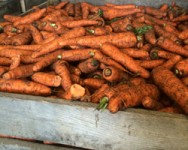Storage Crop Facility School: Smaller-Scale Mixed Vegetable Storage
Event Details
Date
December 8, 2020
Time
9:00am - 2:00pm
Location
via Zoom
Cost
FREE!
Host
Cornell Vegetable ProgramMargie Lund
607-377-9109
email Margie Lund

Join us for this FREE online event to hear the latest information on smaller-scale storage and storage of mixed vegetables. Speakers from across the Northeast and Midwest will be presenting on cold storage construction, humidity and ventilation management, tactics for better storage of produce, decreasing diseases in storage, funding opportunities, and farm food safety considerations for storage facilities.
AGENDA:
9:00 AM - Introduction and overview
9:05-9:30 - Cold storage construction - what to look for in design and materials -- Chris Callahan, University of Vermont
9:30-10:00 - Humidity and ventilation management -- Chris Callahan, University of Vermont
10:00-11:00 - Keeping crops fresh for market -- Scott Sanford, University of Wisconsin
11:00-11:30 - Decreasing potato diseases in storage -- Steve Johnson, University of Maine
11:30-12:00 - Decreasing cabbage Alternaria in storage -- Chris Smart, Cornell University
12:00-12:30 - Funding programs for upgrading or building new facilities, equipment -- Karen Rugenstein, Farm Service Agency
12:30-1:00 - Farm food safety considerations for storage -- Robert Hadad, CCE Cornell Vegetable Program
1:00-1:30 - NYS Farm to School program -- Becky O'Connor, Harvest NY
1:30-2:00 - Additional time for questions and further discussion with speakers
REGISTRATION:
This FREE event will be held online via Zoom or you can listen in by phone. Registration is required. Only those who register will receive meeting attendance information. To register, please email Margie Lund and include the name(s), phone number, and email of those who plan to attend.

Upcoming Events
Orleans Regional Winter Vegetable Meeting
February 9, 2026
Albion, NY
Topics include: Breeding and evaluating tomatoes to control disease and improve yield, jar testing and ensuring spray water quality, breaking down organic matter, FSMA updates and Q&A with Ag & Markets, and industry updates. Includes hands-on learning, coffee break, and sponsor booths.
DEC credits available: 1.0 in CORE plus 0.5 in 1a, 10 or 23
African Eggplant Participatory Breeding Kick-Off
March 5, 2026
Join us to learn about the Cornell African Eggplant Research Project and learn how you can participate! African eggplant, also known as Bitterball, Garden Egg, Kittley and other names, is an important crop for many members of our community with heritage from regions such as sub-Saharan Africa, Southeast Asia, and Brazil. Since 2024, the Cornell African Eggplant Research Project has been collaborating with growers and community partners across New York to develop high-quality varieties adapted to the Northeast U.S. In this meeting, we will share information about growing and preparing African eggplant, highlight our research to date, and invite partners to collaborate with us in our 2026 participatory breeding and variety selection efforts.
COST: FREE! You must pre-register to receive the Zoom link.
Managing the Invasive Swede Midge Webinar
March 6, 2026
Swede midge is an invasive fly that causes serious economic losses to brassica crops. Due to its small size and hidden feeding habits, swede midge is often called an "invisible pest" and damage may be misdiagnosed. In this webinar, we will review the swede midge life cycle and crop damage symptoms, current management recommendations, new research findings, and highlights from on-farm case studies with a focus on organic management.
1.75 DEC pesticide recertification credits in categories 1a, 10, and 23.


































